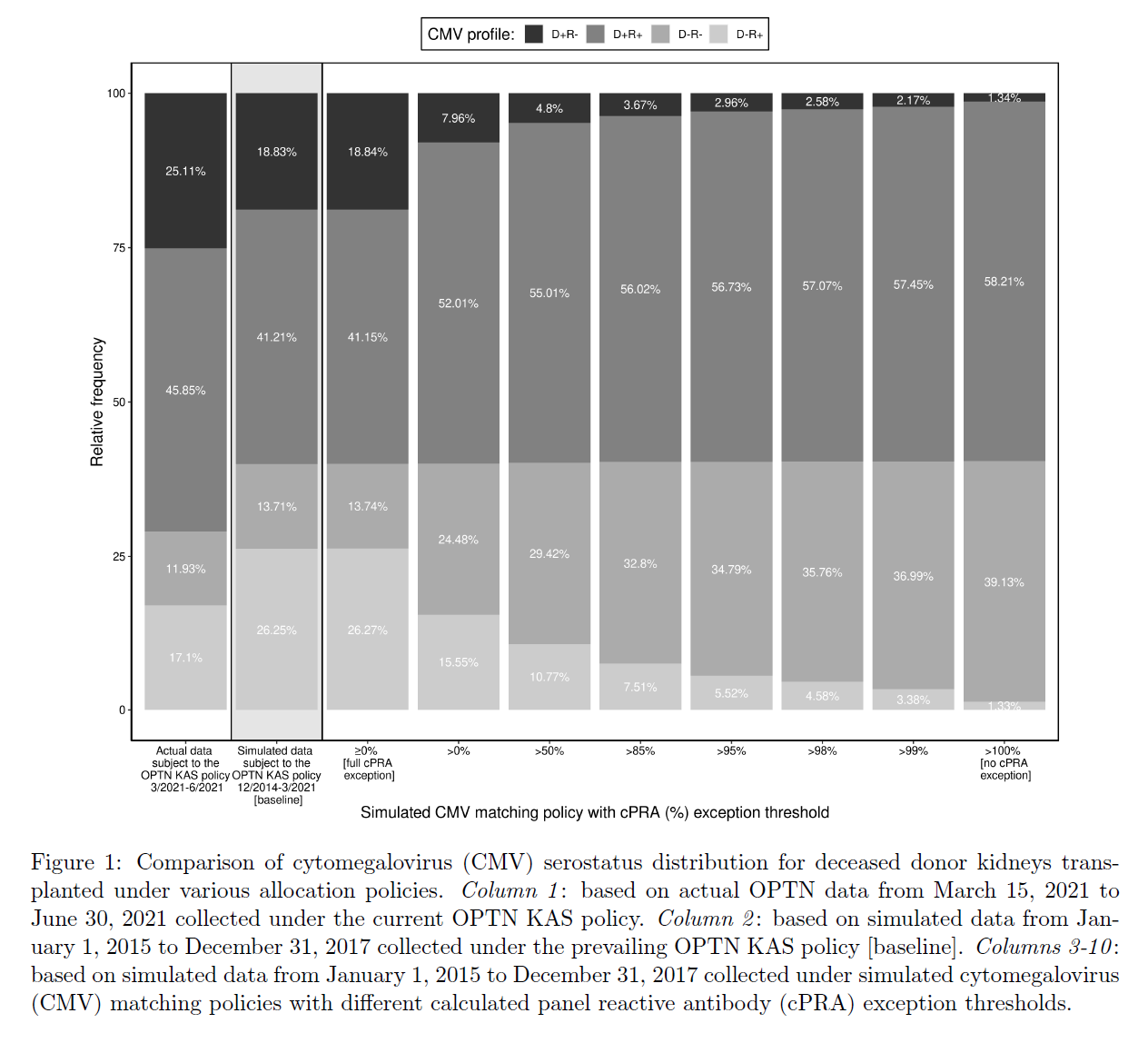Avoiding Cytomegalovirus Mismatching in Deceased Donor Kidney Allocation System in the US
1Division of Nephrology, The University of Arizona, Tucson, AZ, 2Department of Industrial Engineering, Istanbul Technical University, Istanbul, Turkey, 3Department of industrial Engineering, Istanbul Technical University, Istanbul, Turkey, 4Division of Infectious Disease, The University of Arizona, Tucson, AZ
Meeting: 2022 American Transplant Congress
Abstract number: 11
Keywords: Allocation, Cadaveric organs, Cytomeglovirus, Kidney transplantation
Topic: Clinical Science » Kidney » 31 - Kidney Deceased Donor Allocation
Session Information
Session Name: Kidney Deceased Donor Allocation
Session Type: Rapid Fire Oral Abstract
Date: Sunday, June 5, 2022
Session Time: 3:30pm-5:00pm
 Presentation Time: 4:30pm-4:40pm
Presentation Time: 4:30pm-4:40pm
Location: Hynes Ballroom C
*Purpose: Cytomegalovirus (CMV) mismatch, donor-positive/recipient-negative serostatus (D+/R-), carries a high risk of developing CMV infection, graft failure mortality. The current kidney allocation system (KAS) does not consider CMV seromatching (D+/R+ and D-/R-).
*Methods: We modified our validated discrete-event simulation model to evaluate the impact of CMV matching in deceased-donor kidney allocation nationally. Using OPTN data from 2015 to 2017, we compared the simulated deceased donor kidney transplants (DDKT) under the OPTN policy without CMV matching to various CMV matching policies based on calculated PRA exception thresholds (≥0%, >0%, >50%, >85%, >95%, >98%, >99%, >100%).
*Results: Incorporating CMV seromatching significantly decreased the proportion of high-risk (D+/R-) transplants during the simulated period (Figure 1): baseline: 18.83% versus 7.96%, 4.80%, 3.67%, 2.96%, 2.58%, 2.17%; and 1.34% when CMV matching is employed with cPRA threshold >0%, >50%, >85%, >95%, >98%, >99%, and >100%, respectively. Compared to the OPTN policy without CMV matching, incorporating CMV seromatching with cPRA>50% exception threshold: i) decreased the proportion of high-risk (D+/R-) transplants (from 18.83% to 4.80%); ii) decreased mean wait-listed days in CMV R- (from 1,710 to 1,666) and CMV R+ (from 2,110 to 2,063) recipients; (iii) increased transplant rate (i.e., number transplanted per 100-patient years of active wait-time) in CMV R- recipients (from 14.02 to 15.07), while decreasing in CMV R+ patients (from 12.00 to 11.75); iv) decreased discard rate in CMV D- kidneys (from 15.00% to 14.26%), but did not significantly change for CMV D+ kidneys (from 18.66% to 18.73%); (v) marginally improved overall allograft survival at one-year for both CMV R- (from 95.89% to 96.10%) and R+ (from 95.48% to 95.74%) recipients.
*Conclusions: A CMV matching policy with cPRA>50% exception threshold significantly improves the CMV seromatching distribution of transplant recipients while not significantly perturbing equity and utility-focused metrics in KAS.
To cite this abstract in AMA style:
Tanriover B, Sandikci B, Ulukus Y, Ergun MA, Ariyamuthu VK, Al-Obaidi M, Zangeneh T. Avoiding Cytomegalovirus Mismatching in Deceased Donor Kidney Allocation System in the US [abstract]. Am J Transplant. 2022; 22 (suppl 3). https://atcmeetingabstracts.com/abstract/avoiding-cytomegalovirus-mismatching-in-deceased-donor-kidney-allocation-system-in-the-us/. Accessed February 17, 2026.« Back to 2022 American Transplant Congress

